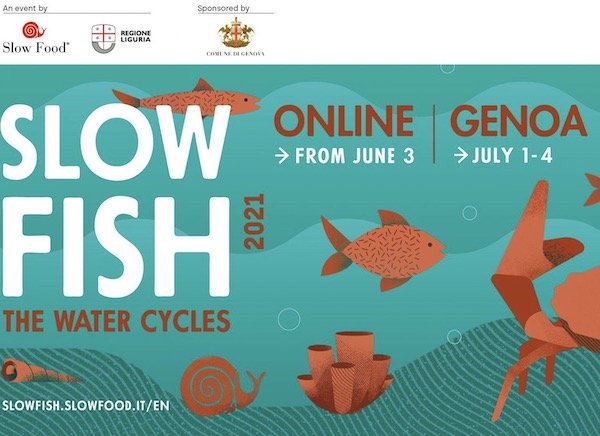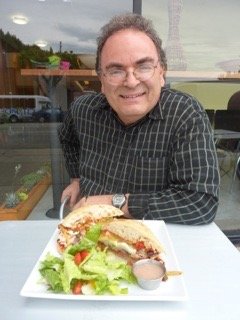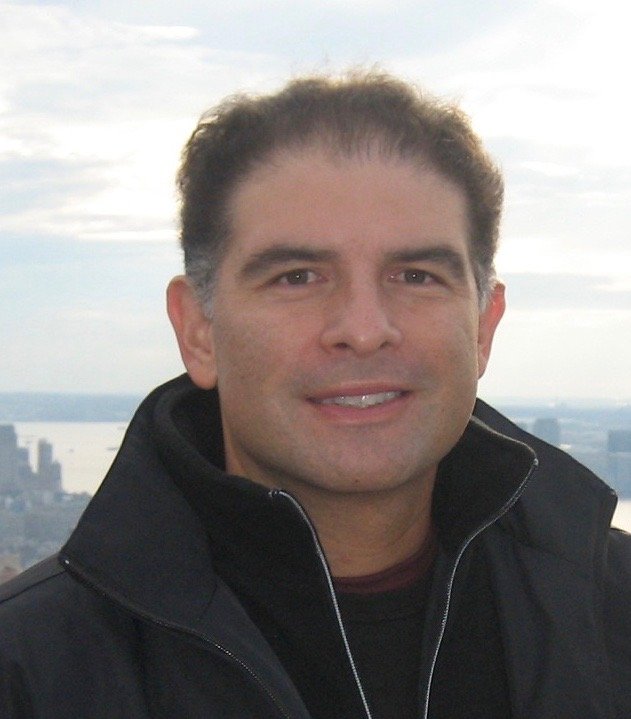Tenth Annual Slow Fish Event
Slow Fish, the biennial event organized in Italy by Slow Food and the Liguria Region, will be divided into both online and offline activities this year due to the ongoing pandemic. The theme of the tenth edition is The Water Cycles.
Online activities start today: a rich program of events addresses the problems and challenges our seas face, bringing together diverse communities of fishers, scientists, cooks and organizations that show us how we can all play a role in creating a better future. There’ll be Conferences and Forums; explanatory How It’s Made videos which reveal production techniques, recipes and other food preparation secrets; Sea Tales, stories of people and communities around the world; Fish Out Of Water, online dialogues that bring apparently-distant worlds together; and Food Talks with writers, economists, philosophers, anthropologists and ecologists.
The physical event will take place in Genoa, Italy, from July 1-4: Taste Workshops, Dinner Dates and other local meetings in Liguria are all on the Slow Fish Menu. Check out the full program at the event website.
“The goal of Slow Fish 2021 is to show how individual and collective choices have collateral effects far beyond what we can see, thanks to the complex web of interconnections which links everything, from the microscopic all the way up to the planetary level”, comments Tasha Sutcliffe, a Canadian independent consultant on fisheries policy and programs and member of the new Slow Fish Advisory Board. This new guiding tool for the international Slow Fish network, presented today, involves researchers, activists and experts from various fields, including fishers. It covers different regional contexts and plays an important cohesive, proactive and pragmatic role within the network.
“Slow Fish has always looked to the seas and the oceans. But the life of the seas and oceans, and their health, has a strong impact on our own lives on this planet”, adds Paula Barbeito, coordinator of the Slow Fish Network. “Think of the influence that the seas and oceans have on the climate, or the ways human behavior can damage these ecosystems. Intensive production activities, for example, require the massive use of chemical substances that pollute the atmosphere, increase atmospheric carbon, and even impact the pH level of the oceans, provoking their long-term acidification. On the other hand, activities which aim for greater sustainability do so by seeking to disturb the natural equilibrium as little as possible.” Find out more here.
The oceans and their interconnections will be the main focus of the conference The Future of Our Oceans, organized on June 8, World Oceans Day. The Slow Fish vision of the oceans as a global commons will be presented by members of the Advisory Board, as well as best practices and potential solutions to common problems.
On June 14 the forum Marine biodiversity: a network of connectionswill show how river basins are fundamental for the transportation of nutrient rich fresh water that is vital to oceanic life. Through stories from all around the world we will explore collective efforts on land to take care of the sea, and what happens when that collective effort does not exist.
On June 21 during the webinar Classifying marine debris we will focus our attention on the policies which aim to reduce the level of plastic in the sea and on how fishers can dispose of marine debris to contribute to improving the health of the seas.
On June 30 we present Foodnected, a project promoting transition to sustainable and fair food systems in the Mediterranean region. Its core values are defined by small-scale food producers whose work represents a better future for people and the planet.
Gardens or monocultures? Seaweed cultivation at the crossroads. During this panel discussion on July 3, small-scale wildharvesters around the world will think critically through contemporary seaweed issues, dominant aquaculture narratives, and the blue economy paradigm.
“For too long, and for complex reasons, policies have not placed the seas at the core of planning activities in the fields of education, the environment, health, economy, and justice,” comments Nina Wolff, expert on fisheries, marine environmental and biodiversity conservation issues and member of the Slow Fish Advisory Board. “The current situation is very critical: it is easy to observe the state of degradation and frailty of the marine ecosystems and of the populations whose survival directly depends on them. But at the same time the current situation also shows positive signs: society is becoming increasingly aware of environmental and food issues and sensitive to the ethics of consumption. We need to seize this opportunity and implement new governance methods and new approaches as soon as possible.”
Slow Fish is also the international Slow Food campaign committed to rediscovering the value chain behind fish. It evolved from the collective knowledge of the international Slow Fish network, a community of fishers, producers, biologists and cooks working to strengthen their social relationships: an indispensable foundation for a healthy and environmentally-friendly value chain.
Slow Fish: The event takes place in odd-numbered years and is organized by Slow Food and the Region of Liguria, with the support of the City of Genoa, the Italian Ministry of Ecological Transition and the Genoa Chamber of Commerce. Slow Fish is also made possible thanks to its main partners BBBell, FPT Industrial, Pastificio Di Martino, Quality Beer Academy (QBA), Reale Mutua and UniCredit; InKind partners Bormioli Rocco, Bormioli Luigi, BSD Liebherr, Rina and S.Bernardo; Green partners PoolPack and Ricrea.


 Gerry Furth-Sides
Gerry Furth-Sides  Barbara Hansen
Barbara Hansen  Chef-owner Alain Cohen
Chef-owner Alain Cohen  Roberta Deen
Roberta Deen  Jose Martinez
Jose Martinez  Nivedita Basu
Nivedita Basu